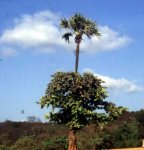By Prashant Mahajan, senior Education Officer, BNHS, Mumbai
Scientific name: Ficus benghalensis
 Banayan is one of the common trees planted as a shade tree along the city roads
Banayan is one of the common trees planted as a shade tree along the city roads
and highways. However, a palm tree growing out of Banyan tree makes an
interesting observation. As a matter of fact the palm does not grow from the
Banyan but its Banyan which grows around the palm tree.
 This is a fascinating creation of birds. Many birds cherish the globular,
This is a fascinating creation of birds. Many birds cherish the globular,
stalk-less figs of Banyan. One of such birds defecates on the palm tree. During
rainy season, the undigested seeds germinate and send thread-like small roots to
the ground. These roots then surround the palm tree with a delicate network.
These roots further thicken and become like mighty ropes. The powerful roots
then start pressing and squeezing the stem of the palm so strongly that all the
capillaries that carry water from ground to the top of the palm get crushed and
blocked. Eventually the palm dies off and its trunk decomposes and disappears
leaving behind a strange, hollow, cage-like structure, formed by the strangler
roots of the Banyan tree hence called "Strangler fig. However the two can
co-exist for along time.
Banyan is found in the sub-Himalayan forests and peninsular India. It has smooth
bark and large leathery leaves. The leaves are used as fodder for captive
elephants and camels. The leaves are also made in to plates. The fruits are fig
like which appear between April and June and October and November as well.
The Banyan is sacred to the Hindus and Buddhists. The great Banyan of Calcutta
has around 1000 trunks. The canopy covers 4 acres and a walk around the tree is
about 400 meter. One can see huge Banyan tree under total control of a palm tree
in gardens, roadside, forest area or agricultural land.